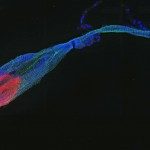Lien vers Pubmed [PMID] – 20194689
Antimicrob. Agents Chemother. 2010 May;54(5):2135-42
This study describes the results of in vitro antimalarial susceptibility assays and molecular polymorphisms of Plasmodium falciparum isolates from Cambodia. The samples were collected from patients enrolled in therapeutic efficacy studies (TES) conducted by the Cambodian National Malaria Control Program for the routine efficacy monitoring of artemisinin-based combination therapy (ACT) (artesunate-mefloquine and artemether-lumefantrine combinations). The isolates (n = 2,041) were obtained from nine sentinel sites during the years 2001 to 2007. Among these, 1,588 were examined for their in vitro susceptibilities to four antimalarials (artesunate, mefloquine, chloroquine, and quinine), and 851 isolates were genotyped for single nucleotide polymorphisms (SNPs). The geometric means of the 50% inhibitory concentrations (GMIC(50)s) of the four drugs tested were significantly higher for isolates from western Cambodia than for those from eastern Cambodia. GMIC(50)s for isolates from participants who failed artesunate-mefloquine therapy were significantly higher than those for patients who were cured (P, <0.001). In vitro correlation of artesunate with the other drugs was observed. The distributions of the SNPs differed between eastern and western Cambodia, suggesting different genetic backgrounds of the parasite populations in these two parts of the country. The GMIC(50)s of the four drugs tested increased significantly in eastern Cambodia during 2006 to 2007. These results are worrisome, because they may signal deterioration of the efficacy of artesunate-mefloquine beyond the Cambodian-Thai border.


